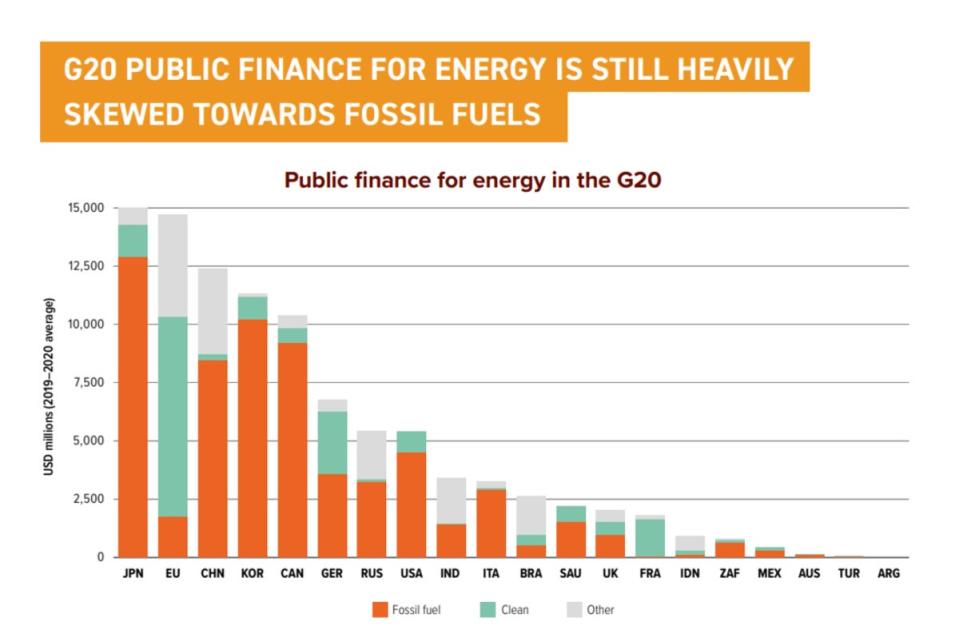G20 backed fossil fuel industry with more money than ever in 2021
Investments in fossil fuels by governments of 20 of the world’s richest and fastest-growing economies reached new heights last year, even before the energy crisis began and despite the worsening impacts of the climate crisis, a new report has revealed.
The Group of 20 or G20, which includes 19 nations and the European Union, invested $64bn in subsidising the production of fossil fuels in 2021, according to the eighth annual Climate Transparency report.
The report, released on Thursday, is compiled by an international partnership of organisations to take stock of climate action by the G20 grouping ahead of the upcoming UN climate summit Cop27.
Wider G20 government fossil fuel subsidies had fallen to $147bn in 2020, but rose again by 29 per cent to $190bn in 2021, according to data from the Organisation of Economic Co-operation and Development (OECD).
The spike in subsidies is partly attributable to the rebound in economic activities after the first year of Covid lockdowns and despite grand promises made by large economies to bring down the use of fossil fuels which are driving emissions and, in turn, global warming.
The report notes that subsidies have continued to rise into 2022, partly because of the Russian invasion of Ukraine triggering skyrocketing energy prices, which have also supercharged profits for energy companies.
“Too much public finance for energy in the G20 is still skewed towards the fossil fuel industry. 63 per cent of G20’s public finance for energy went to fossil fuels in 2019-2020,” said Ipek Gençsü, Senior Research Fellow at the Overseas Development Institute think tank and finance lead of the report.

Ms Gençsü adds that while the G20 promised to “phase out and rationalise” fossil fuel over the time, “it’s clear the G20 has failed to deliver” on those promises and large sums of money continue to be used to “distort the market in favour of fossil fuels”.
Countries with the highest total subsidies for fossil fuels were China, Indonesia and the UK backing production and consumption that will contribute to driving global temperatures, the report stated.
The impacts of the rising emissions caused by the fossil fuel production the countries are supporting, however, have also been extreme.
India was the worst victim of losses among the G20, with heatwaves causing an income loss of $159bn, which accounted for 5.4 per cent of the gross domestic product (GDP) in the service, manufacturing, agriculture and construction sectors in 2021.
The country, historically responsible for only 3 per cent of global emissions but also now the third-greatest polluter, will see 142 million people, or roughly 10 per cent of the population, exposed to summer heatwaves when the world reaches warming of 1.5C.
Also read: ‘Like frogs in a slowly boiling pot’: How India’s heatwave is only set to get worse
“Rising temperatures have brought income losses in services, manufacturing, agriculture, and construction sectors, with India, Indonesia and Saudi Arabia being the most affected countries,” Sebastian Wegner from the Berlin Governance Platform, one of the report’s main authors, said.
“The respective income losses are estimated at 5.5 per cent, 1.6 per cent and 1 per cent of GDP, “ he said.
The current levels of warming already stand at almost 1.2C. The report warns that with increasing temperatures, the impacts of climate change will become ever more severe.
While in Brazil and India, 10 per cent of the current population will likely be affected by heatwaves at 1.5C, the figure rises to over 20 per cent in the scenario of a 3C of warming.
The upcoming Cop27 summit, which is going to take place in Egypt’s Sharm El-Sheikh, will see countries once again negotiating ways to limit warming below the agreed level of the Paris agreement, which is 1.5C. But many experts have warned in the past that the promises made so far fail to limit warming to agreed levels.

 Yahoo News
Yahoo News 
